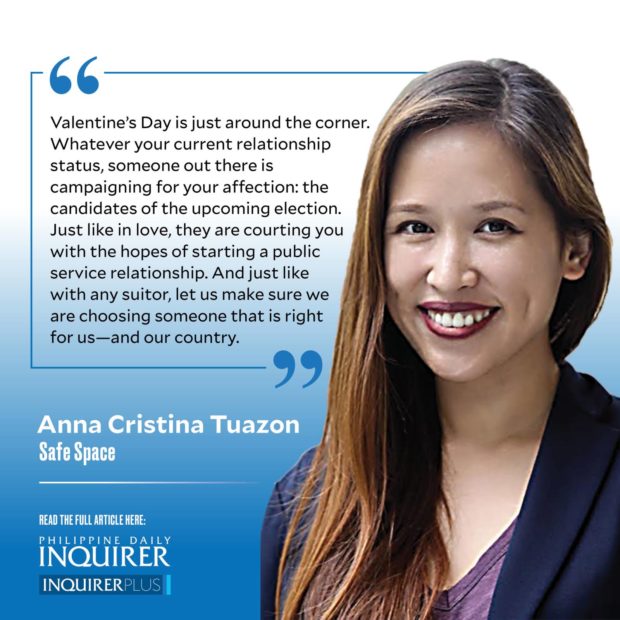Love and elections
Valentine’s Day is just around the corner. Whatever your current relationship status, someone out there is campaigning for your affection: the candidates of the upcoming election. Just like in love, they are courting you with the hopes of starting a public service relationship. And just like with any suitor, let us make sure we are choosing someone that is right for us—and our country.
First, in any panliligaw, expect that they are putting their best foot forward and working hard to impress you. Expect this impression to degrade with time. When evaluating suitors, it is safer to assume that what you see now is most likely the best that you can get from them. With elections, expect their energy, fervor, and passion to be at their peak and expect to get only 70 percent of such energy, if not much lower, later on. If at this stage they are already not putting much effort or are being complacent about the elections, expect worse when they are elected. Expect an absentee leader who refuses to step up when needed, always finding excuses or someone else to blame (usually the previous administration). In election season, most candidates pivot toward a position they think will win votes. Expect idealistic stances to get compromised once they’re in government. Another way to evaluate your candidates’ true stances is to check what they’ve advocated for pre-campaign, way before they were interested in winning you.
Article continues after this advertisementHow your suitors — and candidates — express their affection matters. Do they buy your love with gifts, as in pabahay and outright cash? Do they attempt to win your love with strong rhetoric and quotable soundbytes? It would be better if they show their love through consistent action, even without cameras or reporters to document it.
Faith plays a big role in this country, in politics, and in relationships. Regardless of your affiliation, how the candidates use their faith shows how they’ll manage the separation of church and state. Are they the type to boast or show off their faith, thereby forgetting that they’re supposed to represent all constituents, even those of other faiths? Worse, do they weaponize their faith, using it when convenient to defend injustices and discrimination? We are better off with someone who actually embodies their faith—someone who doesn’t judge or discriminate, who treats everyone with respect and dignity, who practices simple living, and who refuses to be a bystander to corruption and oppression.
When entertaining a suitor, it is important to observe not just how they treat you but how they treat everyone else. If they’re only nice and generous to you (or your province), that is a big red flag and honestly nothing to boast about. It simply means that your candidate discriminates between regions and you are benefiting from that inequality. They are the type to judge and classify people into categories (class, ethnicity, religion, education, etc.) and apportion their respect accordingly. This is the building block of oppression. Carefully observe the difference between how they treat people who work for them and those they work for. In elections, observe how they treat voters who support their opponents. If they treat them with disdain, mockery, and disrespect, you can predict how they’ll react when constituents criticize them in the future.
Article continues after this advertisementWhen choosing a life partner, you’d want someone who can dream — and know how to actualize that dream. In politics, you’d want a candidate who carries ambitious ideals because this means they won’t be too cynical to attempt to change the current system that has preserved our inequalities. At the same time, you would want someone who actually has a credible plan. Wanting to change the system is simply not enough; they need to understand deeply how the system works, appreciate its complexity, and offer a systemic solution. Simple solutions like imposing bans and taxes are not likely to solve anything in the long term.
A potential lover doesn’t just have to adjust to you, they also need to accept that your life includes your family, friends, and career. They need to be willing to get along with the different people in your life for your relationship to work. Likewise, a leader needs to learn how to effectively work with other parts of government—their VP, their Cabinet, the Senate and Congress, and local government units. A worthy leader is willing to work with people with differing views (and differing parties) because they prioritize what is best for our country and not just what is best for themselves.

















